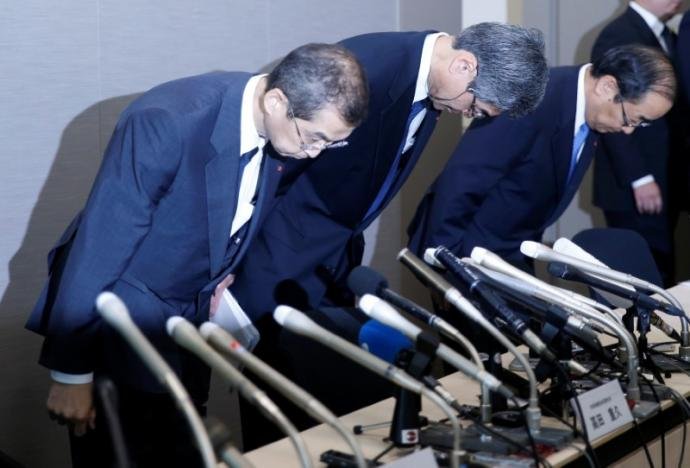Japanese airbag maker Takata files for bankruptcy, gets Chinese backing

In the biggest bankruptcy of a Japanese manufacturer, Takata faces tens of billions of dollars in costs and liabilities resulting from almost a decade of recalls and lawsuits. Its airbag inflators have been linked to at least 16 deaths and 180 injuries around the world because they can rupture and send metal fragments flying.
TK Holdings, its U.S. operations, filed Chapter 11 bankruptcy in Delaware on Sunday with liabilities of $10 billion to $50 billion, while the Japanese parent filed for protection with the Tokyo District Court early on Monday.
Scott Caudill, chief operating officer of TK Holdings, said in a court affidavit that the company "faces insurmountable claims" relating to the recalls and owes billions of dollars to automakers. He disclosed that Takata has recalled, or expects to recall, by 2019 about 125 million vehicles worldwide, including more than 60 million in the United States.
Takata's total liabilities stand at 1.7 trillion yen ($15 billion), Tokyo Shoko Research Ltd estimated.
Final liabilities would depend on the outcome of discussions with carmaker customers who have borne the bulk of the replacement costs, a lawyer for the company said.
The filings open the door to the financial rescue by Key Safety Systems (KSS), a Michigan-based parts supplier owned by China's Ningbo Joyson Electronic Corp (600699.SS).
In a deal that took 16 months to hammer out, KSS agreed to take over Takata's viable operations, while the remaining operations will be reorganized to continue churning out millions of replacement airbag inflators, the two firms said.
The U.S. company would keep "substantially all" of Takata's 60,000 employees in 23 countries and maintain its factories in Japan. The agreement is meant to allow Takata to continue operating without interruptions and with minimal disruptions to its supply chain.
"We believe taking these actions in Japan and the U.S. is the best way to address the ongoing costs and liabilities of the airbag inflator issues with certainty and in an organized manner," Takata CEO Shigehisa Takada said in a statement.
The remainder of Takata assets will be reorganized to produce replacement inflators, but it is not clear how long they will operate.
Takata said it plans to continue building older model inflators for as long as five years at plants in China, Washington state and Mexico. It will not continue producing those inflators at a plant in Germany.
CEO Takada said he and top management would resign "when the timing of the restructuring is set." His family - which still has control of the 84-year-old company - likely would cease to be shareholders.
Takata in February pleaded in a U.S. federal court to a felony charge as part of a $1-billion settlement that included compensation funds for automakers and victims of its faulty airbag inflators. The company expects to honor the terms of the agreement and pay the $850 million due for automaker compensation. Three former senior Takata executives were charged in January in a U.S. court with falsifying test results but have not made a court appearance.
About two-thirds of 46.2 million recalled Takata inflators in the United States have not been fixed. In June 2016, federal regulators said inflators in 2001-2003 model Honda and Acura vehicles have up to a 50-percent chance of a dangerous airbag inflator rupture in a crash and urged owners to stop driving until repairs were made.
The companies expect to seal definitive agreements for the sale in coming weeks and complete the twin bankruptcy processes in the first quarter of 2018.
Takata warned in bankruptcy documents that if it does not complete the restructuring by March and complete payments owed under the deal, the Justice Department could withdraw the plea agreement and seek higher penalties.
It also faces hundreds of lawsuits and claims in the United States, Mexico and Canada, including consumer protection lawsuits filed by three states and 100 personal injury and wrongful death claims. A judge in the U.S. Virgin Islands action had ordered Takata recently to pay $8 million into an escrow account but the payment has not been made, Takata said.
Honda Motor Co (7267.T), Takata's biggest customer, said it had reached no final agreement with Takata on responsibilities for the recall. Honda said it would continue talks with the supplier but anticipated difficulties in recovering the bulk of its claims.
UNPRECEDENTED RECALLS
Takata faces billions in lawsuits and recall-related costs to its clients, including Honda, BMW (BMWG.DE), Toyota Motor Corp (7203.T) and others, which have been paying recall costs to date.
It also faces potential liabilities stemming from class action lawsuits in the United States, Canada and other countries.
Industry sources have said that recall costs could climb to about $10 billion.
The ammonium nitrate compound used in the airbags was found to become volatile with age and prolonged exposure to heat, causing the devices to explode.
Costs so far have pushed the company into the red for three years, and it has been forced to sell subsidiaries to pay fines and other liabilities. Founded as a textiles company in 1933, Takata began producing airbags in 1987 and at its peak became the world's No.2 producer of the safety products. It also produces one-third of all seatbelts used in vehicles sold globally, along with other components.
The Tokyo Stock Exchange said its shares would be delisted on July 27. The stock has collapsed 95 percent since January 2014.
Related News


